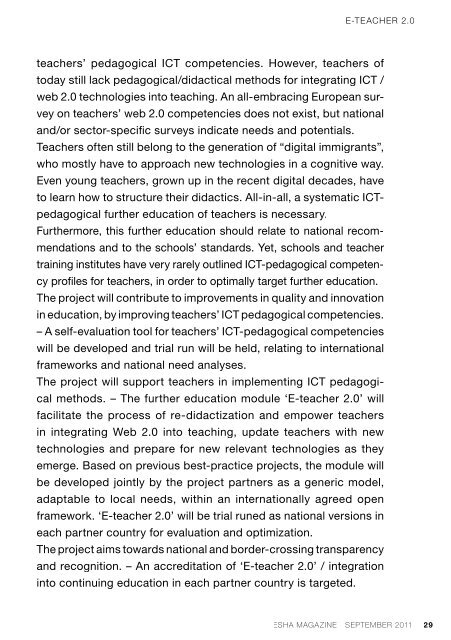Magazine - ESHA
Magazine - ESHA
Magazine - ESHA
You also want an ePaper? Increase the reach of your titles
YUMPU automatically turns print PDFs into web optimized ePapers that Google loves.
teachers’ pedagogical ICT competencies. However, teachers of<br />
today still lack pedagogical/didactical methods for integrating ICT /<br />
web 2.0 technologies into teaching. An all-embracing European sur-<br />
vey on teachers’ web 2.0 competencies does not exist, but national<br />
and/or sector-specifi c surveys indicate needs and potentials.<br />
Teachers often still belong to the generation of “digital immigrants”,<br />
who mostly have to approach new technologies in a cognitive way.<br />
Even young teachers, grown up in the recent digital decades, have<br />
to learn how to structure their didactics. All-in-all, a systematic ICT-<br />
pedagogical further education of teachers is necessary.<br />
Furthermore, this further education should relate to national recom-<br />
mendations and to the schools’ standards. Yet, schools and teacher<br />
training institutes have very rarely outlined ICT-pedagogical competen-<br />
cy profi les for teachers, in order to optimally target further education.<br />
The project will contribute to improvements in quality and innovation<br />
in education, by improving teachers’ ICT pedagogical competencies.<br />
– A self-evaluation tool for teachers’ ICT-pedagogical competencies<br />
will be developed and trial run will be held, relating to international<br />
frameworks and national need analyses.<br />
The project will support teachers in implementing ICT pedagogi-<br />
cal methods. – The further education module ‘E-teacher 2.0’ will<br />
facilitate the process of re-didactization and empower teachers<br />
in integrating Web 2.0 into teaching, update teachers with new<br />
technologies and prepare for new relevant technologies as they<br />
emerge. Based on previous best-practice projects, the module will<br />
be developed jointly by the project partners as a generic model,<br />
adaptable to local needs, within an internationally agreed open<br />
framework. ‘E-teacher 2.0’ will be trial runed as national versions in<br />
each partner country for evaluation and optimization.<br />
The project aims towards national and border-crossing transparency<br />
and recognition. – An accreditation of ‘E-teacher 2.0’ / integration<br />
into continuing education in each partner country is targeted.<br />
E-TEACHER 2.0<br />
<strong>ESHA</strong> MAGAZINE SEPTEMBER 2011 29


